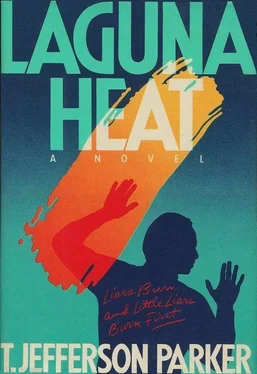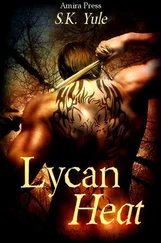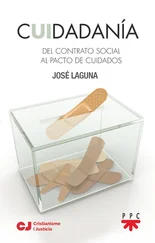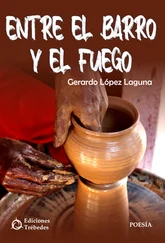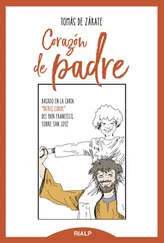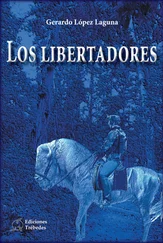Shephard lit a cigarette to break the reverie, then pushed to a music station. The song was dreadful but helped to erase the vision of Morris Mumford from his mind. At night it was different. At night, Morris lived inside him and did as he pleased.
The traffic thickened as he approached Corona del Mar. By the time he reached the first traffic light, the cars had coalesced into an unmoving mass of colors, shining chrome, puffs of exhaust. Children bustled up and down the sidewalks, across the crosswalks, through the stationary traffic. They carried the accoutrements of beach kids: boogie boards, swim fins, portable radios, skateboards, blankets. Shephard watched a thin, tan boy with a sunbleached mop of hair bob down the sidewalk in front of him, the Tom Shephard of another lifetime. He was carrying a pair of swim fins and a beach towel over his shoulder. Shephard called out over the door of the convertible: “Hey, how are the waves?”
The boy turned without breaking stride, shot Shephard the thumbs-up signal, then turned back to the bright sidewalk before him. Walk it all the way to Alaska, Shephard thought. His own pale reflection in the rearview mirror, cigarette dangling from under the drooped mustache, was the face of someone who no longer bore relation to the waves at Corona or to the boy on the sidewalk, he thought. Closer to the corpse in the bathtub, or the one in the dirt of Tim Algernon’s driveway. Closer to cigarettes. Closer to death. Closer to the middle, closer to the end. Maybe it was he who should walk to Alaska.
The light changed to green and the cars lurched forward to wait at the next one.
Ten minutes later he had emerged from the Corona del Mar snarl, opened up his speed past Newport Center and the office of South Coast Investigators, and eased down the long slope of highway to the bay bridge. The Balboa Bay Club slipped by to his left.
The first yellow apartments of the Surfside Club appeared to the west, dwarfed by high palm trees that tilted in the breeze. As he swung into the Surfside entrance and stopped at the guard house, Hope Creeley’s words found their way to his mind. Bad luck in the air at the Surfside. The guard was a trim man of about sixty, Shephard guessed. He stepped from the house with a humorless expression, a clipboard in his hand. Shephard smiled and noted that the guard’s holster was on his left hip but he held a pen in his right hand.
“Thinking about a suite,” he said. “Like to have a look around.” The guard perched himself over the car, bent down to have a look inside, then made a brief study of Shephard. “Tom Johnston is the name.”
“Appointment, Mr. Johnston?”
“Lease lines were busy all morning. Drove in from L.A. anyway. The city is driving me crazy.”
“Like that this time of year. Sign in, please.” He passed Shephard the clipboard, who registered with a bogus Beverly Hills address and phone number. The guard — Shephard saw that his name was Arthur Mink — read the information and pointed behind the guard house. “Guest lot around and to your right. Have a nice visit, Mr. Johnston. The leasing office is next to the lounge on A Dock.”
Shephard followed the two-lane road around the guard house and along the flank of the Surfside convention room, where it opened onto a wide expanse of mostly empty parking spaces. The few cars there were clustered around the tennis courts. He put the Mustang between a Rolls-Royce Corniche and a black Seville, and as he swung open the door saw that all of the court marked 7 was taken up by Joe Datilla. The other courts around him were full and several patient players were waiting for their turn, but Datilla was on his alone, driving serves from a bucket of yellow balls at his feet. Shephard admired his precision: stoop for a ball, a breath and an arching of the back as he tossed up the target, a quick rotation of torso and arms as his legs straightened and the racquet rose to full extension, then snapped down. Follow through, return stance, a pleased nod as the ball screamed over the net and smacked into the far quadrant.
Shephard stood at the chain-link fence and witnessed two more serves before Datilla looked over his shoulder. His scowl turned to a smile.
“Tommy Shephard! I’ll be damned.” Racquet in hand, he came to the fence and swung open the gate. Datilla’s handshake was firm and warm, the kind of handshake that says you’re part of the team. “How’s that head doing? You were a little drugged when I saw you last.”
“Just fine. That Scotch made it a little more palatable.”
“The least I could do.” Datilla’s eyes searched Shephard’s face for a brief moment. Shephard noticed that he wasn’t sweating. “What brings you to the Surfside? Everything okay?”
“I’m fine, but my city’s a little on the nervous side. Two murders in one week. Broke all records.”
Datilla sighed. “All I can say is I’m glad I’m not in your business. Any good leads?”
“Let’s talk a minute, Joe.”
Datilla moved his racquet to the other hand and pointed to the bench by the fence. “You got it, Tom. Anything I can do.”
They sat down, Datilla pulling a maroon windbreaker over his suntanned body, Shephard lighting a cigarette. Datilla looked like a man who could afford to be good to himself, Shephard thought, and was.
“The victims are Tim Algernon and Hope Creeley,” Shephard began. “They used to play tennis here. Did you know them?”
“Very well. Hope was married to my partner, Burton. Tim and his wife Margie were charter members. We opened just before the end of the war.”
“Did they know each other?”
“Oh sure. Small group then. Your father and mother were with us. Good times.”
“Were they involved?”
Datilla brushed a hand through his silver hair. His eyes were blue and perplexed when it came away.
“In what?” he asked.
“Each other.”
The perplexity turned to relief. “No.” He smiled. “Not those two. Tim was dedicated to his wife. Straight shooter all the way. Hope was very much in love with Burton, too. They had their differences, but I don’t think Tim Algernon was one of them.”
“Enemies, jealousies, rivals? Anyone who didn’t like them?”
Datilla propped the racquet against the bench and slowly shook his head. “You know, Tom, after the war we got together here whenever we could. Hard play, hard drink, nothing but fun. Believe me, we’d earned it. Any rivalries we had were settled right on these courts. Skin-deep rivalries, nothing more than that. And forgotten in the lounge when the beer started flowing. Sorry, no.”
Shephard was suddenly aware of the threadbare line of investigation that had led him to this point. Two dead people, each members of the same tennis club nearly thirty years ago. Datilla seemed to read his thoughts. He took up the racquet again, twirled it in his hand, waited for Shephard’s next question.
“Whoever killed Algernon and Creeley didn’t do it for money. He’s left plenty of property behind in both houses. The killer threatened them both. He’s doing what he says he’ll do. Algernon was an older man who ran a stable and bet a little on the horses. Creeley was a civic-minded gal who stayed inside with a dog that couldn’t bark. Algernon tried to warn her. Called twenty-four times and got a machine. I don’t get it. Why would someone want to do that to an old woman like Hope Creeley?”
Datilla stared at the cement. He zipped up the wind-breaker, then slowly unzipped it, his hand performing the action disconsolately, automatically. “I’ve been asking myself those same questions since I first heard about Tim.” Datilla’s eyes were moist. “Tommy, I can’t imagine a reason. The harder I try, the less I believe it’s happened. Maybe the killer picked out the two people who deserve it least. Is that a lead?” He smiled weakly and shook his head.
Читать дальше
